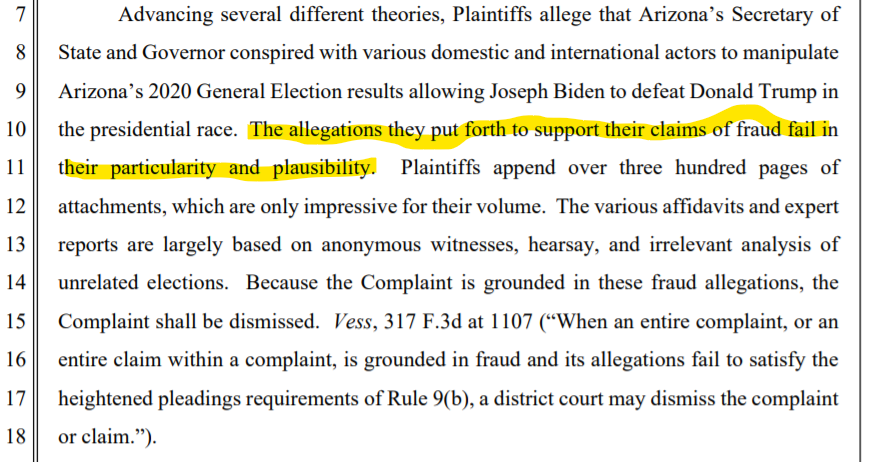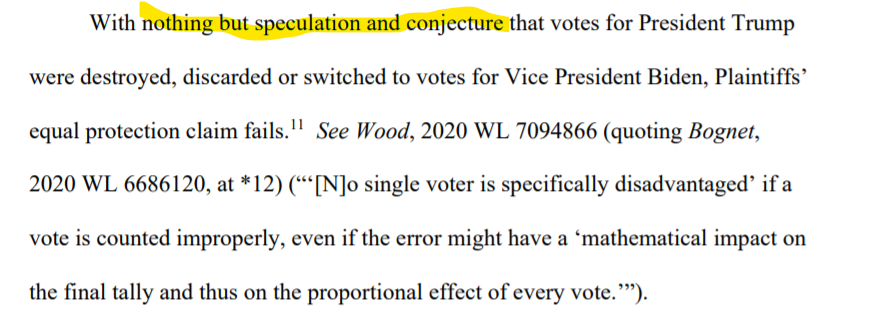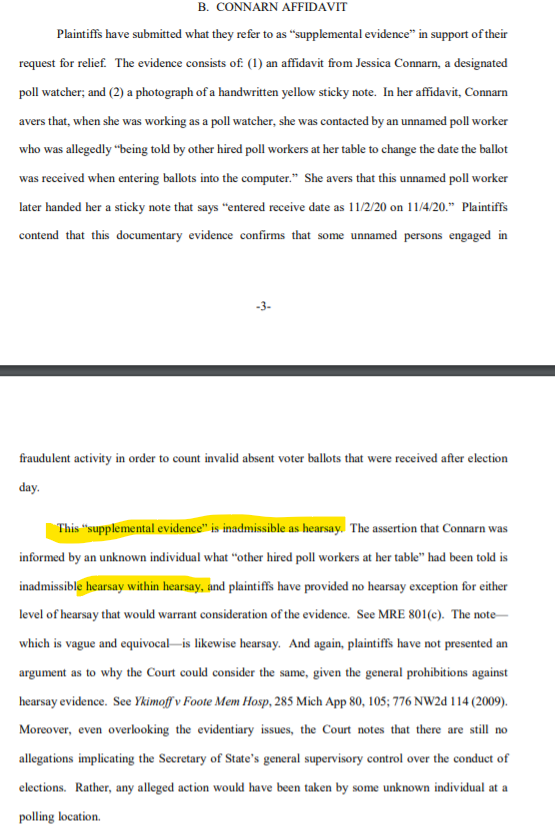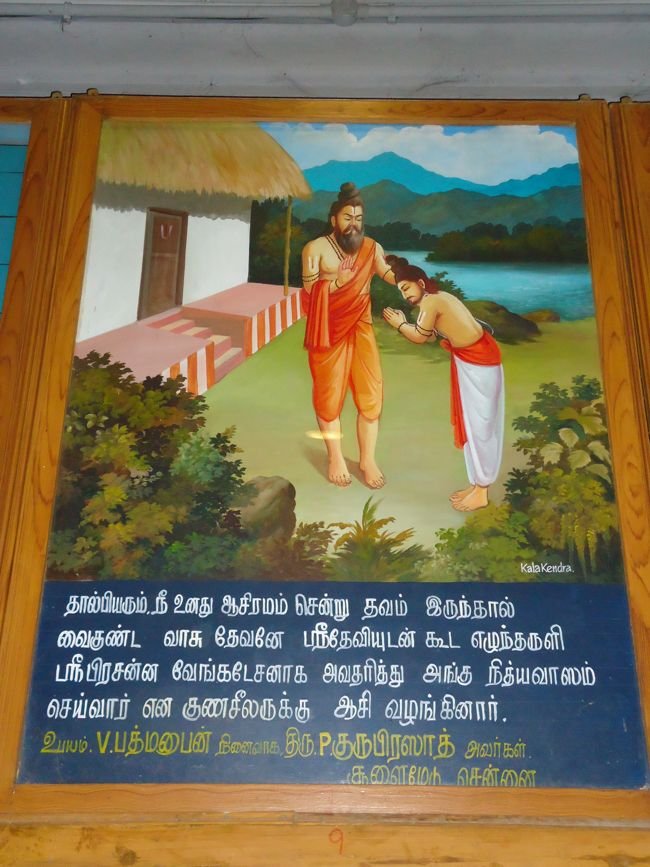1/ I want to briefly tease out Cruz's statement, which will help set expectations about what might happen January 6:
More from Law
This issue was repeatedly highlighted bu Judge Totenberg:
Dominion’s system “does not produce a voter-verifiable paper ballot or a paper ballot marked with the voter’s choices in a format readable by the voter because the votes are tabulated solely from the unreadable QR code.”
Judge also found that Dominion's QR codes are NOT encrypted:
“Evidence plainly contradicts any contention that the QR codes or digital signatures are encrypted,”
This was “ultimately conceded by Mr. Cobb and expressly acknowledged later by Dr. Coomer during his testimony.”
Judge Totenberg said there was “demonstrable evidence” that the implementation of Dominion’s systems by Georgia placed voters at an “imminent risk of deprivation of their fundamental right to cast an effective vote,” which she defined as a “vote that is accurately counted.”
Judge Totenberg found that Dominion Systems inherently could not be audited.
She noted that auditors are severely limited and “can only determine whether the BMD printout was tabulated accurately, not whether the election outcome is correct.“
Totenberg stated in her ruling that a BMD printout “is not trustworthy” and the application of an Risk-Limiting audit (RLA) to an election that used BMD printouts “does not yield a true risk-limiting audit.”
Georgia used RLAs to claim no fraud...
Dominion’s system “does not produce a voter-verifiable paper ballot or a paper ballot marked with the voter’s choices in a format readable by the voter because the votes are tabulated solely from the unreadable QR code.”
Witness explaining that on electronic ballots (QR code ballots), it's impossible to determine voter intent. The machine decides the intent, whereas, with paper ballots, a human can double-check the ballot. https://t.co/kkhamio2Je
— The Election Wizard (@Wizard_Predicts) December 30, 2020
Judge also found that Dominion's QR codes are NOT encrypted:
“Evidence plainly contradicts any contention that the QR codes or digital signatures are encrypted,”
This was “ultimately conceded by Mr. Cobb and expressly acknowledged later by Dr. Coomer during his testimony.”
Judge Totenberg said there was “demonstrable evidence” that the implementation of Dominion’s systems by Georgia placed voters at an “imminent risk of deprivation of their fundamental right to cast an effective vote,” which she defined as a “vote that is accurately counted.”
Judge Totenberg found that Dominion Systems inherently could not be audited.
She noted that auditors are severely limited and “can only determine whether the BMD printout was tabulated accurately, not whether the election outcome is correct.“
Totenberg stated in her ruling that a BMD printout “is not trustworthy” and the application of an Risk-Limiting audit (RLA) to an election that used BMD printouts “does not yield a true risk-limiting audit.”
Georgia used RLAs to claim no fraud...
This thread will debunk "the judges didn't look at evidence" nonsense that has been going around.
Over and over again, judges have gone out of their way to listen to the evidence and dismantle it, enjoy the carnage!
1/
Bowyer v. Ducey (Sidney Powell's case in Arizona)
"Plaintiffs have not moved the
needle for their fraud theory from conceivable to plausible"
This is a great opinion to start with. The Judge completely dismantles the nonsense brought before her.
2/
https://t.co/F2vllUhM2G

King vs. Whitmer (Michigan, Sidney Powell case)
"Nothing but speculation and conjecture"
This is a good one to show people who think affidavits are good evidence. Notice how the affidavits don't actually say they saw fraud happen in Detroit.
3/
https://t.co/NZAtqivWkL

Trump v. Benson (Michigan)
"hearsay within hearsay"
Another good one to show people who think affidavits are absolute proof.
4/
https://t.co/17GeGhImHF

Stoddard v. City Election Commission (Michigan)
"mere speculation"
/5
https://t.co/ekqYEqiIL9

Over and over again, judges have gone out of their way to listen to the evidence and dismantle it, enjoy the carnage!
1/
Bowyer v. Ducey (Sidney Powell's case in Arizona)
"Plaintiffs have not moved the
needle for their fraud theory from conceivable to plausible"
This is a great opinion to start with. The Judge completely dismantles the nonsense brought before her.
2/
https://t.co/F2vllUhM2G

King vs. Whitmer (Michigan, Sidney Powell case)
"Nothing but speculation and conjecture"
This is a good one to show people who think affidavits are good evidence. Notice how the affidavits don't actually say they saw fraud happen in Detroit.
3/
https://t.co/NZAtqivWkL

Trump v. Benson (Michigan)
"hearsay within hearsay"
Another good one to show people who think affidavits are absolute proof.
4/
https://t.co/17GeGhImHF

Stoddard v. City Election Commission (Michigan)
"mere speculation"
/5
https://t.co/ekqYEqiIL9




























